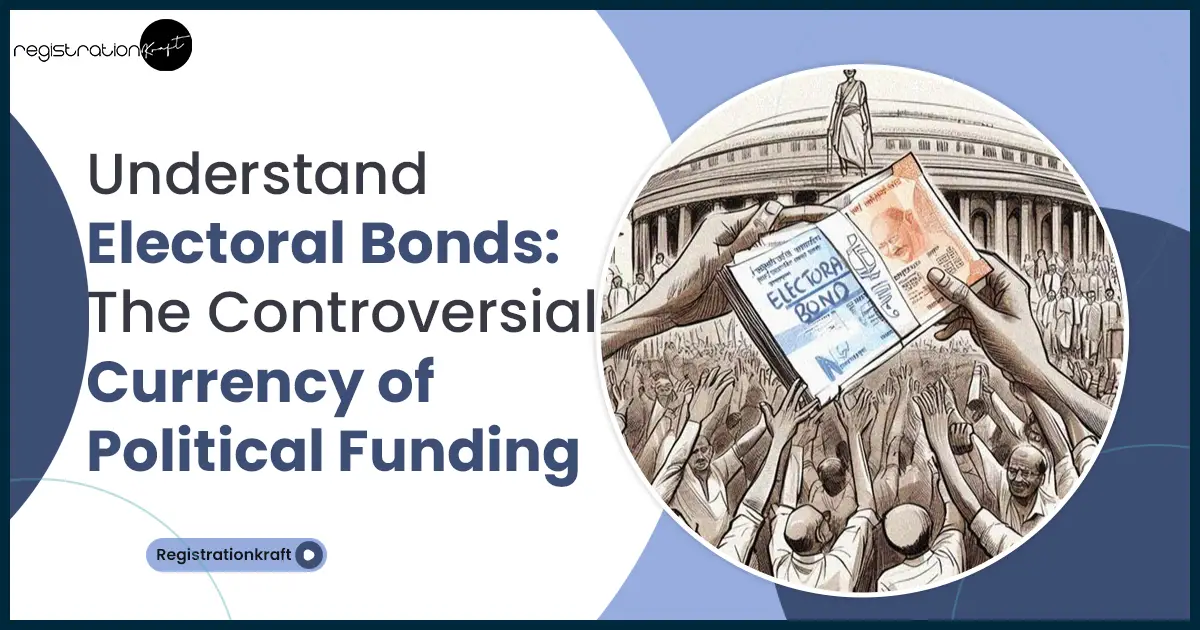If there is one thing that has been doing rounds in the media amidst the upcoming poll season, it is electoral bonds. As the Hon’ble Supreme Court ordered the State Bank of India to disclose the donors and beneficiaries of electoral bonds issues after 2019, the resultant brought everything in the open as the documents revealed how much money was used to bought electoral bonds and which political party got how much money. But what are electoral bonds? How do they work? When was they brought and by whom? Let’s get to know everything about them in this post.
What are electoral bonds?
As its name indicates, an electoral bond is a quite new kind of political funding in India. The concept of electoral bonds was brought in the year 2017. These bonds are sold in denominations of 1,000 rupees ($12), 10,000 rupees ($120), 100,000 rupees ($1,200), 1 million rupees ($12,000) and 10 million rupees ($120,000). They can be purchased by individuals, groups or corporate groups and donated to any political party, which can then redeem them, without paying any interest, after 15 days. Buying electoral bonds simply allowed people and businesses to donate unlimited sums of money to any political party anonymously. However, these bonds must be taken from the State Bank of India (SBI) but can be given to any political party in the form of donation.
While donors purchasing electoral bonds are theoretically unidentified, SBI provided access to this data of donors to the ruling party, which is supposed to discourage big-ticket donors from employing electoral bonds to donate to opposition parties.
As electoral bonds are considered bearer instruments, no ownership detail is kept in record, and the holder of the bond is considered its owner. The name and other details of the donor are not put in the instrument, and therefore, electoral bonds remain anonymous.
Who are eligible to purchase electoral bonds?
Any citizen of India and an entity/corporation setup in India is eligible to purchase an electoral bond from the nearby State Bank of India (SBI) branches. The bonds can be bought individually or in combination with other people. However, purchases should only be done through only KYC-compliant accounts to donate to a political party.
In general, the following individuals residing in India are eligible to purchase an electoral bond:
- A Hindu Undivided Family (HUF)
- A company
- A firm
- An Association of Persons (AOP) or a Body of Individuals (BOI), whether incorporated or not
- Every other artificial juridical person
- Any office, agency or branch owned or controlled by an artificial judicial person
What are documents required to buy an electoral bond?
The following documents may be needed when it comes to purchasing an electoral bond:
- Application form and pay-in-slip
- Copy of citizenship proof
- KYC documents
- If the payment is made from a bank account other than SBI, a proforma from the remitting branch, as given on the SBI website, informing the source of funds on the letterhead of the branch, signed and stamped by the branch manager
The list of citizenship proof documents is as follows:
In the case of individuals, any of the below mentioned documents:
- Passport
- Voter ID card
- Letter from the national population register for the states of Assam, J&K and Meghalaya
In the case of non-individuals, any of the following documents:
- Certificate of incorporation
- Partnership deed or trust deed
- Any other document showing incorporation or establishment in India
The list of KYC documents for individuals is as follows:
- Aadhaar card with current address
- Permanent Account Number (PAN) or Form No. 60 as defined in Income Tax Rules, 1962
- In case the PAN is not available, or the Aadhaar card does not have the current address, any one of the following Officially Valid Documents (OVDs) can be submitted:
- Passport
- Driving license
- Voter’s ID card issued by ECI
- Job card issued by NREGA signed by a State Government Officer
- Letter issued by the national population register having the name and address details
The list of KYC documents for a company, firm or trust is as follows:
- Certificate of incorporation or registration certificate
- Memorandum of Association and Articles of Association/partnership deed/trust deed
- Resolution from the board of directors along with a power of attorney given to its managers, employees or officers to transact on its behalf in case of a company
- PAN of the company/firm/trust
- Aadhaar number and PAN or Form 60 as defined in the Income Tax Rules, 1962, issued to officers, managers or employees holding an attorney to transact on the company/firm/trust’s behalf
- Declaration of beneficial ownership in the specified format
- Photographs and self-attested KYC documents of each beneficial owners
Electoral Bonds Tax Exemption
Electoral bond donations done by people or corporations remain exempted from tax under Section 80GG and Section 80GGB under the Income Tax Act, 1961. Political parties can get donations according to the provisions of Section 13A of the Income Tax Act.
What was the reason behind the introduction of electoral bonds?
Electoral bonds were brought by BJP to enable high levels of transparency to the realm of political funding in India. These bonds make things more transparent since political parties receive donations through official banking platforms that are assessed by government authorities. The details of the donors remain anonymous and confidential, thereby eliminating the risk of bullying or retaliation from rival political parties.
The fundamental idea behind the launch of electoral bonds was to bring down black money in politics and enable a transparent and lawful apparatus for people and businesses to donate to political parties. They serve as a way for donors of the bond to make donations to affiliated political parties while ensuring anonymity.
In addition, in 2017, India’s biggest banking body, the Reserve Bank of India (RBI), warned the Modi government that the bonds could be misused by shell firms as a way of money laundering. In 2019, the Election Commission of India (ECI) stated the system as “a retrograde step as far as transparency of donations is taken into account”.
From the year 2018, a large number of anonymous donors have donated almost 16,000 crore rupees to different political parties by purchasing electoral bonds. Between 2018 and March 2022 – the period assessed by the Association for Democratic Reforms (ADR), a nongovernmental organisation – 57 percent of donations via electoral bonds (about $600m) went to the ruling party – Bhartiya Janta Party.
Amidst the ongoing poll season, this disclose has created a havoc in the country as people got to know the details of individual and corporates that bought electoral bonds. As a major part of this money is given to the ruling party, it has got an edge over its counterparts that can be a game changer in the Indian political scenario.
What caused the disclose of the details of electoral bonds?
In the year 2017, two NGOs – ADR and Common Cause and the Community Party of India made two separate petitions in the Supreme Court, asking the supreme law authority to end this electoral bond scheme.
After a period of 6 years, the Supreme Court finally concluded that this scheme has several flaws and it needs to be ended. The court stated that this EB scheme has fuelled an “information black hole” and “has to be removed” as it places “a premium on opacity”.
How electoral bonds impacted the Indian economy?
In the financial year of 2016-17 and 2021-22, 7 national parties and 24 regional parties got a cumulatie donation of Rs.9,188.35 crore through the purchase of electoral bonds.
The biggest donations through electoral bonds, amounting to Rs.3,438.8237 crore, were got in 2019-20. The year 2021-22 received a total of donations worth Rs.2,664.2725 crore via electoral bonds, that covered 11 Assembly elections.
Among total donations of Rs.16,437.635 crore got by the 31 political parties, 55.90% emerged from electoral bonds, 28.07% from businesses and 16.03% from other sources.
The electoral bond sales data fetched as per the Right to Information Act in May 2023 disclosed the following details:
- Five cities – Kolkata, Mumbai, New Delhi, Hyderabad and Chennai, reported for 90% of all electoral bonds purchased by individuals and businesses.
- Mumbai remains the biggest contributor at 26.16% of the total electoral bonds transacted.
- Bengaluru held for a bit over 2% of the total bond sales.
- SBI, New Delhi branch is the most sought-after choice for redeeming electoral bonds, with 64.55% of all bonds redeemed till date.
- Hyderabad and Kolkata held the second and third positions in regard to redemption, while Mumbai got just 1.51% of all electoral bonds redeemed despite getting for more than 26% of all sales.
The Conclusion
Thought the purpose of introducing electoral bonds in Indian political system is to bring superior levels of transparency in donations being made to political parties, it raised the issue later as clear information was not available to anyone expect the ruling party. The latest ruling by the Hon’ble Supreme Court has got the attention of all as the list of purchased electoral bonds, their buyers, and the beneficial is made common to the public. Moreover, from now onwards, the Supreme Court has stopped and sale and purchase of electoral bonds.
FAQs
Where the purchase of electoral bonds can be made?
An individual or business can purchase electoral bonds during the initial 10 days at the start of every quarter. The first 10 days of months like January, April, July, and October when one can purchase the electoral bonds.
However, an extra period of 30 days is also provided by the Government in the year of Lok Sabha Elections.
Who is liable to issue electoral bonds?
Any Indian business house, affiliated agency or undivided Hindu family are liable to issue electoral bonds by donating money to the political parties as per their own preference.
What is the time period for bond liquidity?
Once an electoral bond gets sanctioned, there is a period of 15 days for political parties to encash it.
Which bank can sell the electoral bonds?
Only the State Bank of India is permitted to sell electoral bonds through its 29 branches.

